Regions lead the way in aligning Skills and Innovation for Europe’s Green and Digital Future
17/06/2025
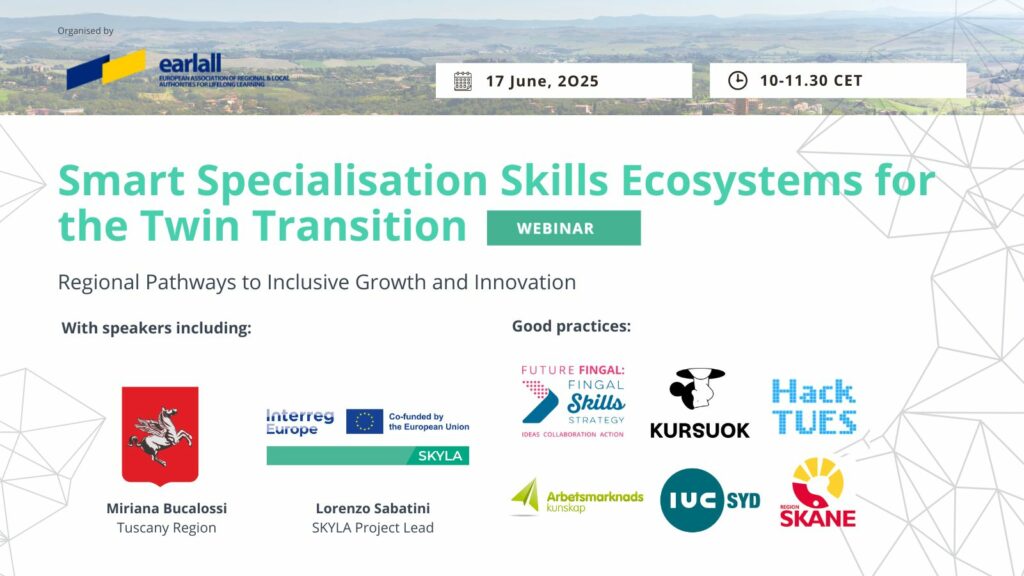
On 17 June 2025, over 40 participants joined the webinar “Smart Specialisation Skills Ecosystems for the Twin Transition: Regional Pathways to Inclusive Growth and Innovation”, co-hosted by the European Association of Regional and Local Authorities for Lifelong Learning (EARLALL) and the Tuscany Region. The event was organised in the framework of the SKYLA – Smart Specialisation Skills Ecosystems for the Twin Transition Interreg Europe project.
The session highlighted a growing consensus: Europe’s twin transition is not only about green technologies and digital tools—it is a social and economic transformation requiring inclusive, place-based responses. Regions are leading this charge by building resilient skills ecosystems grounded in smart specialisation and lifelong learning.
The event opened with welcoming remarks from Alicia Gabán (EARLALL) and Miriana Bucalossi (Tuscany Region), who framed the central question: How can skills development become a driver of regional transformation in line with smart specialisation and cohesion policy?
Miriana Bucalossi showcased Tuscany’s dual apprenticeship pathway in the wine sector and pre-apprenticeship programs as powerful examples of how regional VET systems can support local innovation and sustainable growth.
Greening VET: Global and European Insights
Keynote presentations from Stelina Chatzichristou (Cedefop) and Kenneth Barrientos (UNESCO-UNEVOC) explored how green skills and sustainability are being embedded into VET systems across Europe and beyond.
Stelina presented Cedefop’s latest skills intelligence tools, including the online job advertisement analysis platform, revealing a clear trend: green skills are increasingly in demand—even in traditionally non-green occupations. She introduced the joint Cedefop-UNESCO “Meeting skill needs for the green transition” practical guide and underlined the role of apprenticeships, micro-credentials, and local governance in scaling up green education and training.
Kenneth brought a global perspective, sharing examples from Thailand and Mauritius and highlighting UNESCO’s recent guidance on integrating sustainability into VET institutions. While 68% of UNESCO Member States have adopted policies to green VET systems, fewer than half have yet placed green skills at the core—revealing both progress and room for growth.
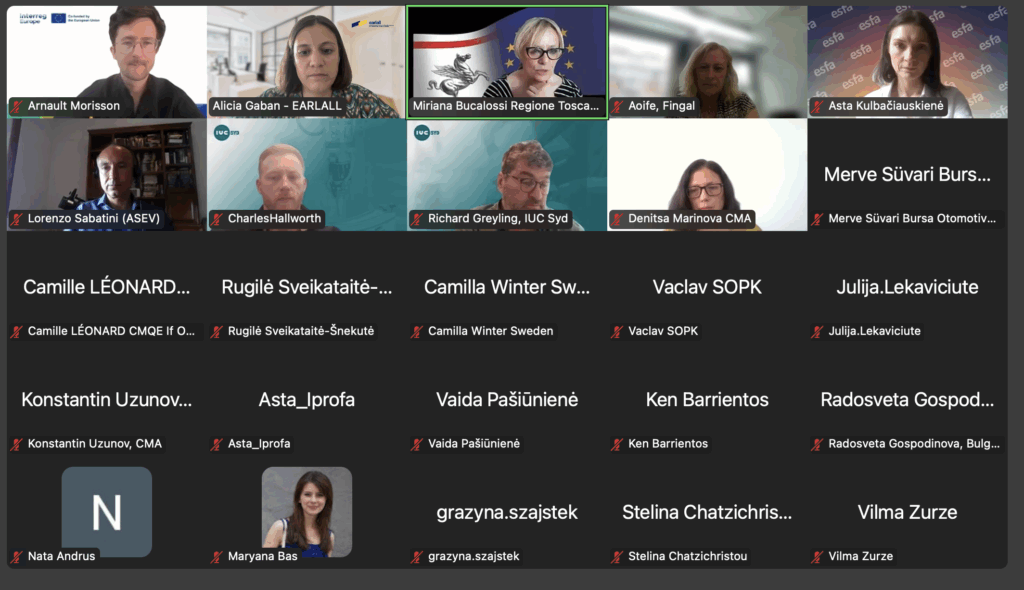
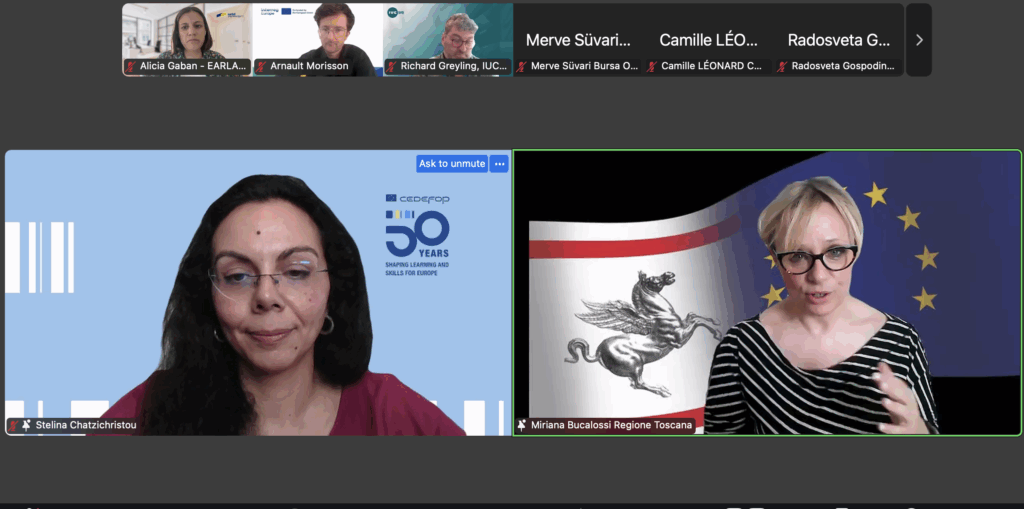
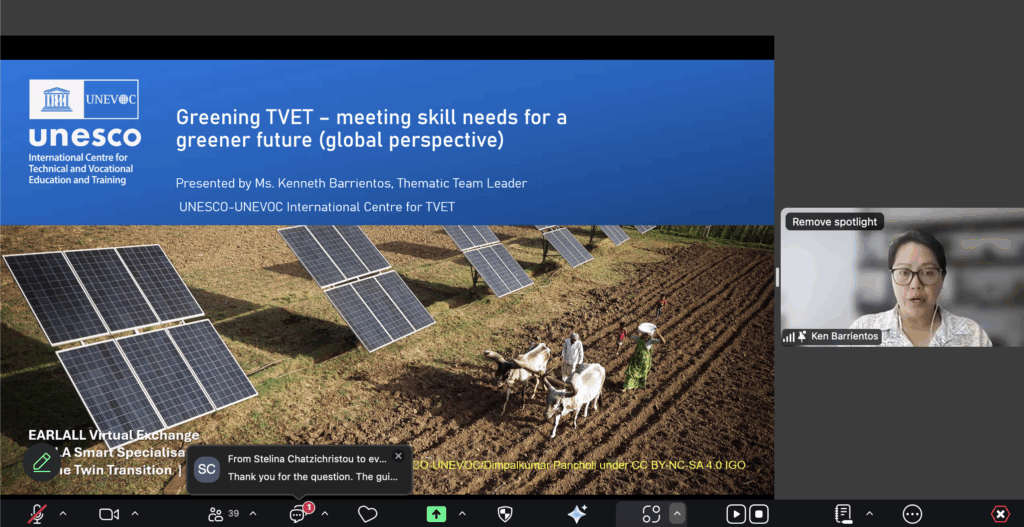
Local Innovation in Action: Fingal’s Skills Strategy
Aoife Sheridan (Fingal County Council, Ireland) provided a local case study on how a targeted skills strategy can overcome systemic barriers. Sustainable Fingal combines labour market forecasting, green and digital skills pathways, and inclusive measures—such as childcare access and support for neurodiverse learners—to boost SME participation and workforce resilience.
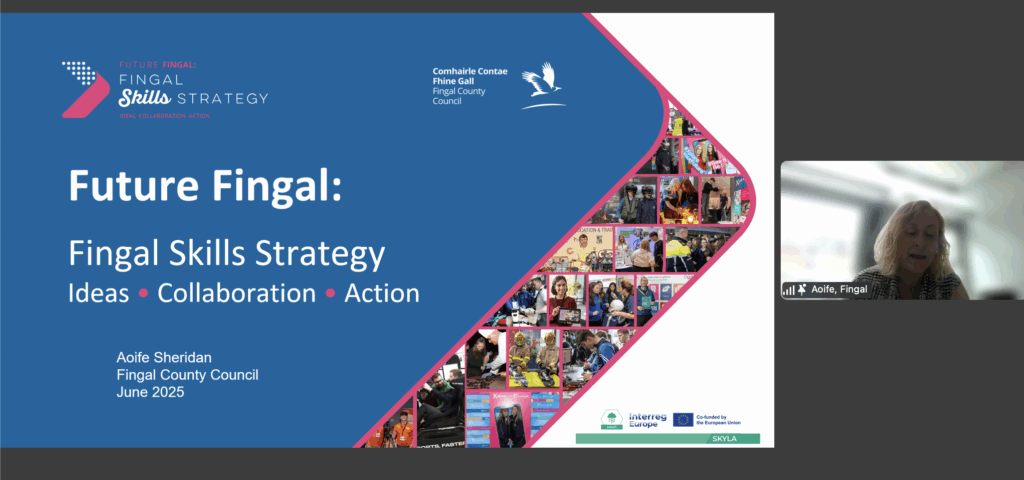
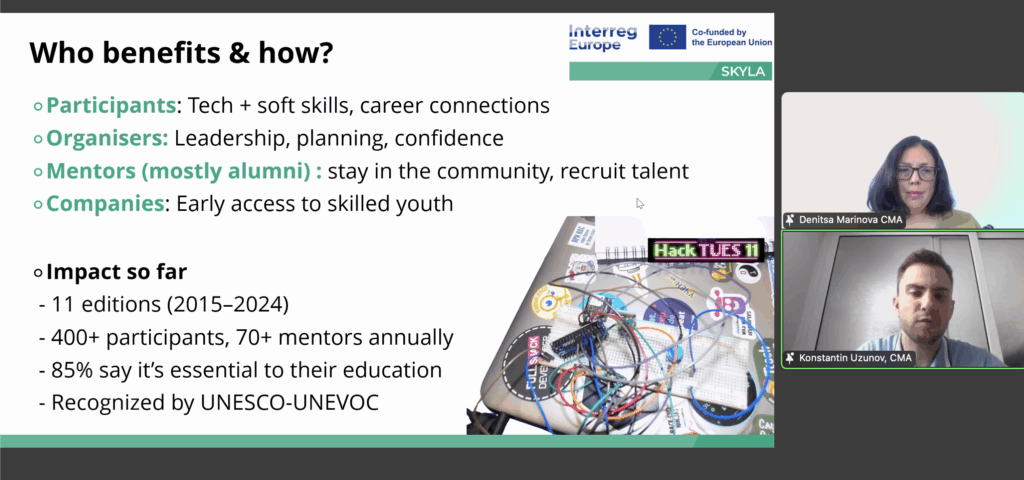
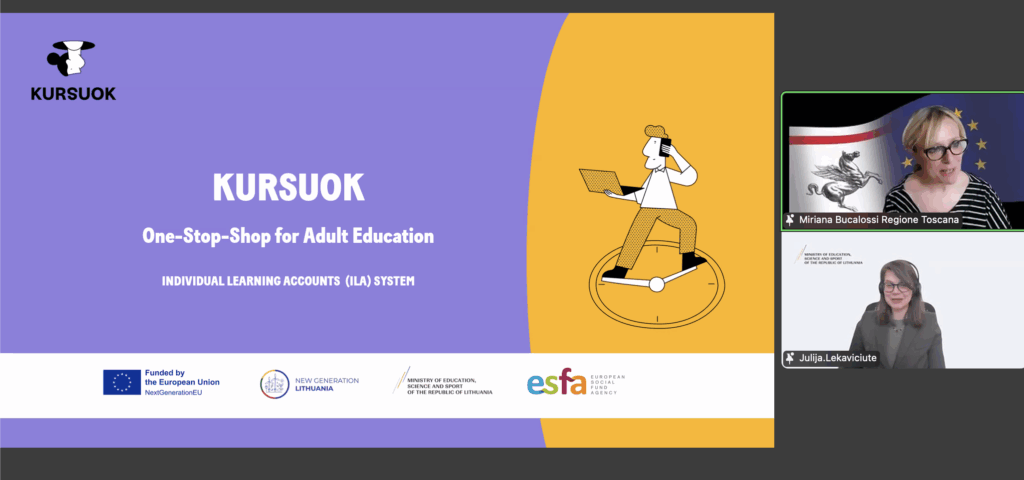
Regional Good Practices: Lessons from Across Europe
Arnault Morisson (Interreg Europe Policy Learning Platform) introduce the Policy-learning opportunities and how the peer-learning experts pool can benefit regions. Following his presentation a series of SKYLA Good Practices that are building inclusive and forward-looking skills ecosystems were presented:
- Sweden – AMK Labour Market Insights
Presented by Richard Greyling and Charles Hallworth, this initiative uses real-time data to identify future skills shortages, particularly in healthcare, agriculture, teaching, and tech. Outreach in schools helps inspire future talent and reduce mismatches. - Bulgaria – Hack TUES (Sofia)
Denitsa Marinova shared how this student-led hackathon, supported by Sofia Tech University, develops digital and soft skills through project-based learning. The initiative demonstrates how business-school collaboration can strengthen youth employability. - Lithuania – KURSUOK Adult Learning Platform
Julija Lekavičiūtė presented Lithuania’s national one-stop platform for adult learning. Launched in 2024, it provides up to €500 per learner for training, with more than 70,000 users and 14,000 certificates issued to date. The platform supports digital, language, and entrepreneurial upskilling through a network of over 300 providers.
Policy Reflections: Building Skills Ecosystems for the Future
In his closing remarks, Lorenzo Sabatini (Empolese Valdelsa Development Agency) underscored the importance of interregional cooperation and bold local policies. He emphasized the need for data-informed planning, flexible apprenticeships adapted to AI-era realities, and deeper collaboration between VET, innovation, and cohesion actors.
“Regions are not only implementing policy—they are shaping it,” he noted, echoing the core message of the webinar.
This webinar offered more than insights—it was a call to action. As Europe accelerates its green and digital transitions, regional actors are showing that aligning skills with smart specialisation is not only possible but essential. Through collaboration, data, and inclusive strategies, regions can lead the way to a more innovative, sustainable, and socially cohesive Europe.
Resources:
- ▶️ Recording
- Stelina Chatzichristou, Team facilitator Skills intelligence and foresight, Cedefop – Presentation
- Kenneth Barrientos, Programme Officer and thematic Team Leader, UNESCO-UNEVOC – Presentation
- Aoife Sheridan, Senior Executive Officer | Fingal County Council – Presentation
- Arnault Morisson, Policy Expert at the Interreg Europe Policy Learning Platform – Presentation
- AMK Labour Market Insights – Richard Greyling (Industrial Development Center South – Presentation
- By students, for students: Hack TUES inspires innovation and IT learning – Denitsa Marinova (Cluster of Mechatronics and Automation, Bulgaria) – Presentation
- KURSUOK (Lithuania): Ms. Julija Lekavičiūtė from the Lifelong Learning Department of the Ministry of Education, Science and Sport – Presentation

